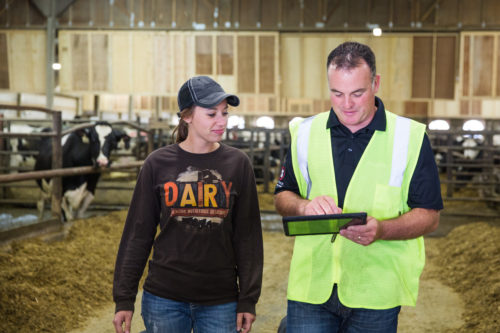How Can We Help? Are You Utilizing Your Nutritionist?
Posted: November 15, 2019 | Written By: Ali Holub, Form-A-Feed Nutrition and Production Specialist

Growing up on a dairy farm in Northwest Wisconsin, I got to see firsthand how much of a team effort farming really is. In addition to family members and employees, there was a constant variety of different consultants around that were trying to help improve, inform, and meet goals as easily and cost effectively as possible. But how do you know if you’re getting the most knowledge and service out of the consultants you work with? I have listed a few service areas that consultants, like your dairy nutritionist, can bring to your operation.
Financials
Making sure you have a clear understanding of your financials will make life easier in many ways. You’ll have less stress when meeting with your banker, when milk prices drop, or when something breaks down and you need to make an unexpected purchase or repair. Farm consultants can help you keep track of these costs on a regular basis. Feed costs are an ever-changing thing based on your forage quality, animal needs, etc. Your nutritionist should have a running list of numbers for you; things like purchased feed cost, cost per pound of dry matter, and income over feed cost. These are all very important numbers and can correlate to many things.
It is also very important to have a full understanding of your accurate break-even cost. When things get tough and you are making close to or even less than your break-even cost, you need to know how to get that number down as much as possible without sacrificing quality or income.
Employee Management
No matter how big or small your dairy operation is, employee management needs to be a priority. Even if all employees are family, this should still be at the top of your list. Everyone thinks differently and has a different way of doing things, so by creating standard operating procedures and written rules and regulations this will help your operation run smoothly. Training employees properly not only what to do, but why we do things is essential. If someone does not understand how the prepping protocol helps to minimize mastitis, somatic cell count, and initiate milk flow, then that protocol is less important to them and they are less likely to follow it. If protocols are written out, explained, and reviewed on a regular basis there is a greater chance of meeting goals and having your operation run smoother.
Herd health
The health of your herd should be at the top of your list, but sometimes it is tough to know why something is going awry or how to fix it. This is another area where feed consultants can really be helpful. Some of the best conversations I will have with producers is a result of something not going the way they would like it to. Whether this is a problem with feed quality, sick calves, or they are just looking for options and ideas to improve.
Our goal is to see every producer succeed and meet their goals. To do this, we often will help with things like sanitation protocols on everything from cleaning calf pens to prepping the cows before they get milked. We will watch body condition score, do manure screening, and evaluate the TMR using a shaker box to see how the balanced ration is doing with the cows. If you ever have a question on anything having to do with the overall health of your animals, don’t be afraid to ask your nutritionist. We are here to help.
Forages
Something that can be overlooked on the farm is forage. Putting up good quality forage makes such a big difference in the success of the farm and the animals. Obviously, years like this when there were so many weather challenges, it makes it tough to do sometimes, but this is where feed consultants can really come in handy. The use of inoculants and acids can help to increase fermentation rate and drop pH levels, as well as decrease shrink. They are important when you may be putting up less than ideal moisture silages.
Keeping a close eye on forage inventory can also save a lot of stress in the summer months. By watching inventory levels closely on a month-to-month basis we can have a better idea if you’re going to be running low. Then we can have the discussion on things like forage extenders, alternate feed products, and if there is a possibility to cull some of the low-end producing animals or extra heifer inventory. These are all steps that, if taken ahead of time, can help decrease the amount of stress during the busy crop season.
I am sure that these topics all have crossed your mind at one point or another, but do you ask for help from your Form-A-Feed consultant? We are a service-based company that has a variety of specialized employees that have a main goal of helping you be the best farmer you can be. So, give your nutritionist a call and see how we can help you!